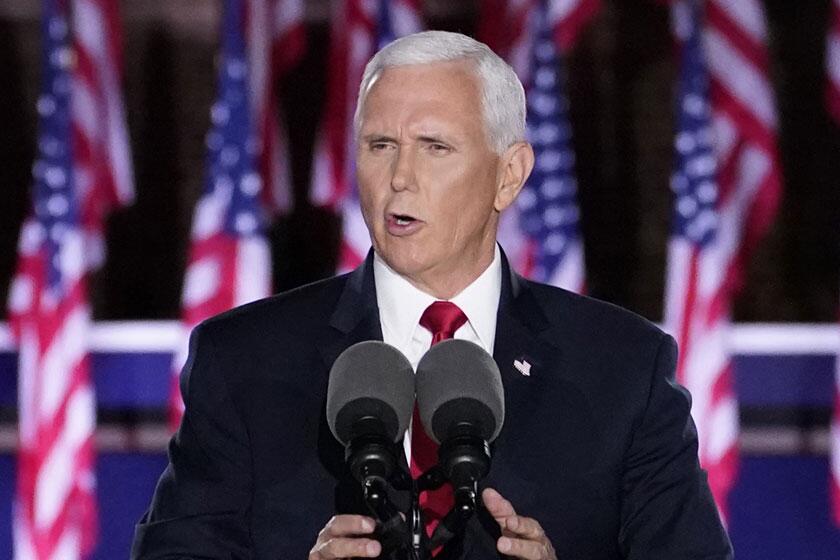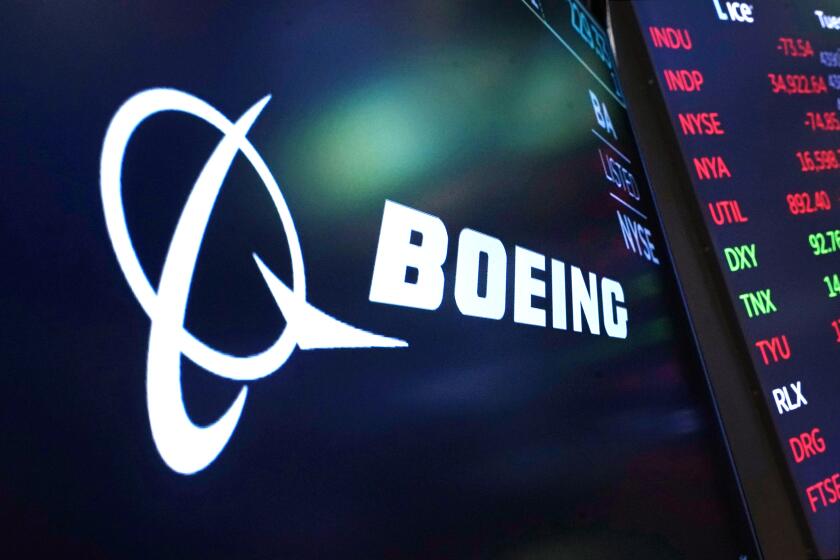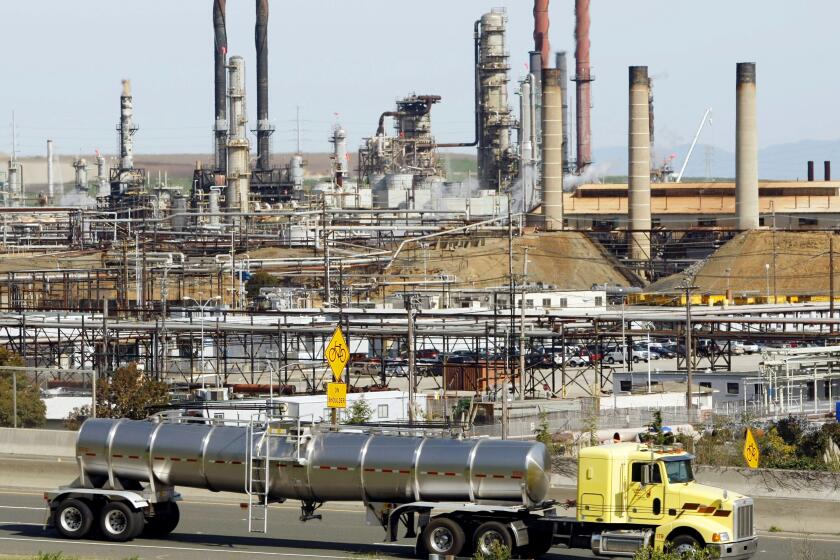Column: How CEOs are threading the needle in talking about Israel and Gaza

“Disappointing at best, disastrous at worst”: That’s how Anti-Defamation League Chief Executive Jonathan Greenblatt described the response of American corporate leaders to the Oct. 7 Hamas terror attack on Israeli civilians. Companies were opting for silence, Greenblatt told CNN in an interview on Oct. 11, because “most CEOs think it’s too political.”
But is that so?
Scores of U.S. corporations have issued statements about the terror attack and its aftermath; the list of companies doing so maintained by Yale’s business school currently exceeds 180 and includes some of the country’s largest corporations, as well as small and medium-size businesses.
The price innocent civilians are paying as this crisis unfolds is absolutely devastating to witness.
— Citigroup CEO Jane Fraser
Many of these statements explicitly condemn antisemitism, the surge of which in the U.S. and globally since the attack was Greenblatt’s immediate concern; he was speaking specifically of the reluctance of corporations to sign on to the ADL’s Workplace Pledge to Fight Antisemitism.
By some standards, business leaders have been “rising to the occasion,” in the words of Jeffrey Sonnenfeld, senior associate dean at the Yale School of Management, and Steven Tian, research director of the school’s Chief Executive Leadership Institute. “Those missing in action are other pillars of civil society,” including leading nonprofits, they wrote in Fortune on Oct. 18.
Get the latest from Michael Hiltzik
Commentary on economics and more from a Pulitzer Prize winner.
You may occasionally receive promotional content from the Los Angeles Times.
The expectation among consumers and workers that corporate leaders will address social and political issues has heightened in recent years for several reasons. One is a sense that political dysfunction in America has hobbled the political system’s ability to solve even the most pressing problems, placing more pressure on corporations to fill the vacuum.
Another is a growing recognition that corporate policies are not neutral factors in our lives — they can foster or fight global warming, promote or diminish gender and ethnic discrimination, and influence legislative initiatives of all kinds.
That has led to demands by shareholders and workers that companies acknowledge their public responsibilities explicitly and act according to their own stated values.
The right wing is trying to turn environmental investing into a boogeyman, as it did with critical race theory.
Among the leading promoters of this trend has been Larry Fink, chairman and chief executive of the investment firm BlackRock. “Stakeholders are pushing companies to wade into sensitive social and political issues — especially as they see governments failing to do so effectively,” Fink wrote in his 2019 letter to shareholders. “As divisions continue to deepen, companies must demonstrate their commitment to the countries, regions, and communities where they operate, particularly on issues central to the world’s future prosperity.”
Corporate positions on social issues haven’t always gone beyond the rhetorical, and sometimes their actions have run directly counter to their expressed values.
Some have taken stands they thought were unexceptionable, only to find themselves embroiled in partisan culture wars. That happened to Target this year, when it continued its years-long support of LGBTQ+ rights during Pride Month in June, only to find itself the butt of partisan right-wing backlash. Corporations have taken heat from conservative politicians for embracing “ESG” (environmental, social and governance) principles.
It would be understandable, therefore, if the complexity of Israeli-Palestinian relations, which has confounded efforts at peacemaking since the establishment of the state of Israel in 1948, gave business leaders pause.
So it’s also understandable that the statements issued by American corporations fall into a handful of categories: They condemn the Hamas attack and antisemitism generally, pledge financial support for humanitarian relief organizations active on both sides of the Gaza Strip boundaries and express support and solicitude for their employees and their families in Israel.
Some corporate statements issued in the days following the attack expressed the determination to “stand with Israel,” a reflection of the brutality of the attack and its horrific toll. More recent statements have acknowledged the rising civilian toll in Gaza under Israeli and Egyptian blockades and Israeli airstrikes.
Still, the willingness of American business leaders to issue statements about the Hamas attack surprised even Sonnenfeld, who maintained a roster of American corporate responses to the Russian invasion of Ukraine in February 2022.
Goldman Sachs, Comcast, AT&T and others are quietly supporting attacks on abortion and voting rights.
Contrary to the public impression that corporate CEOs have been shy about commenting on the Hamas attack, “We’re shocked at the momentum” of companies speaking out, Sonnenfeld told me.
Just shy of four weeks after the attack, there are more than twice as many firms on Yale’s list of companies that have condemned the attack than there were at the same point after the invasion of Ukraine.
At this writing, more than 180 corporations have commented on the Hamas attack, compared with about 70 that had condemned the Russian attack. (That latter list eventually grew to about 1,200 companies, though Sonnenfeld expects the flow of comments on the Hamas attack to crest at fewer than that figure.)
“There is a hierarchy of ease in talking about certain topics,” Sonnenfeld told me. Global warming is the easiest to talk about, possibly because it’s a way to check the box on environmental policy without getting tied up in discussions about other ecological challenges, such as soil erosion and wildlife management.
Gender issues are also relatively easy to talk about, Sonnenfeld says, because gender parity is easy to measure and “somewhat easier to fix.” Racial justice is harder because it seems to be more resistant to change — though on both issues of diversity “we still have a long way to go.”
One factor that might explain the relative willingness of American corporations to take a stand against Hamas, which controls the Gaza administration and launched its terror attack from the Gaza Strip, is that none has any significant investment or staff in Gaza.
That’s in contrast to Russia and Ukraine, where American businesses had spent decades building commercial and industrial ties and thus found it harder to speak out against the invasion and unwind their business ties once they came under pressure from pubic opinion and international economic sanctions to withdraw from Russia.
Opportunities for outside investment in Gaza have been effectively nonexistent: According to the U.S. State Department, the unemployment rate there is estimated at 45%, much worse than the 13% rate in the West Bank, the other Palestinian population center neighboring Israel.
The average daily wage in Gaza is estimated at about $15, compared with $37 in the West Bank and $79 in Israel. These figures are at least partially the result of stringent constraints on movement into and out of the Gaza Strip imposed by Israel and Egypt, the latter of which controls access to the territory from the south.
“Nobody has one dollar of investment in Gaza,” Sonnenfeld says. Indeed, the largest economic flow into Gaza appears to be American government aid. Many American companies have sizable investments and workforces in Israel, however.
Corporations of all kinds are getting an earful from shareholders and the SEC about the need to disclose climate change impacts.
That may account for the thrust of many early corporate statements about the Hamas attack, which tended to express solicitude for Israeli employees and their families and reiterate commitment to the Israeli market.
“We are a significant bank in the country, and many of our people have lost friends and loved ones,” Citigroup CEO Jane Fraser told investors during the company’s third-quarter earnings call on Oct. 13. “Others are being called up to serve. Despite all they’re dealing with, they are keeping our bank running in the country. And I’m, frankly, in awe of their commitment.”
Speaking more broadly, Fraser said that “the price innocent civilians are paying as this crisis unfolds is absolutely devastating to witness.”
A look at some of the corporate statements shows how they have tried to thread the needle — meeting demands by consumers and employees that they take a stand, without saying anything that could be misinterpreted as endorsing the Hamas terror attack or long-held Israeli policies in the West Bank and Gaza, which are politically controversial even within Israel.
“I am heartbroken and furious to read the terrible news out of Israel,” Pfizer CEO Albert Bourla wrote on Twitter on Oct. 12. “Terrorist actions, including the hostage-taking of civilians, the desecration of bodies, and the murder of children and the elderly, violate the most basic tenets of humanity and must be universally condemned in the strongest terms.”
Bourla committed Pfizer to supporting “several key organizations that are providing critical emergency assistance in the region” and to matching employee donations.
American Express said it would donate $3 million to humanitarian relief efforts in Israel and Gaza, and match employees’ contributions. Walmart CEO Doug McMillon announced on LinkedIn that, in response to “an increase in antisemitic speech and hate crimes,” the Walmart Foundation would donate $1 million to the United States Holocaust Memorial Museum to support outreach programs to educate about the history and lessons of the Holocaust and the dangers of antisemitism ... to promote human dignity.”
Verizon said it would donate $2 million to relief organizations including Magen David Adom, an Israeli affiliate of the Red Cross and Red Crescent that provides emergency medical relief, and Save the Children, and would match employee donations up to $1,000 each. Walt Disney Co. said it would donate $1 million to Magen David Adom and another $1 million to other nonprofit organizations in the region, “particularly those with a focus on providing aid to children.”
IBM CEO Arvind Krishna announced on the company’s website on Oct. 11 that among IBM employees in Israel “one IBMer was killed defending their family, and an IBM retiree also lost their life.” He pledged corporate support for employees and their families, and added, “We join the global community in the hope that peace and safety can be quickly restored.” In follow-up statements he said the company would match “employee donations to humanitarian organizations that are supporting relief efforts.”
One discordant note has been struck by Starbucks, which has exploited the situation to advance its detestable anti-union campaign by making a big deal over an unquestionably ill-considered post by an outpost of the unionization campaign and painting the union as pro-Hamas. The union disavowed the post.
American companies have found the nearest thing to a safe space by focusing on the need for humanitarian relief across the entire region and on the imperative to stamp out antisemitism.
The Israeli-Hamas conflict plainly won’t be resolved any time soon, its ultimate consequences in lives on both sides of the Gaza borders impossible to gauge at this moment. But it’s likely to get only more complicated in coming days, weeks, months or longer — for everyone.
More to Read
Get the latest from Michael Hiltzik
Commentary on economics and more from a Pulitzer Prize winner.
You may occasionally receive promotional content from the Los Angeles Times.













